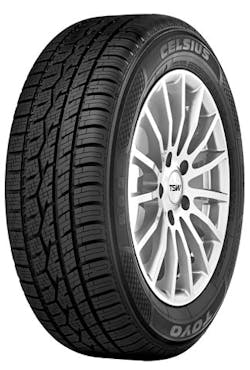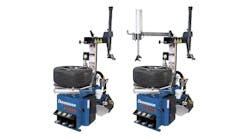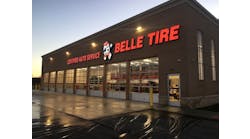The new Toyo Celsius is not an all-season tire like the Toyo Extensa A/S. It’s not a winter tire like the Toyo Observe GSi5.
It’s something that bridges the gap between the two. It performs much better than the Extensa A/S on ice and snow, and features a 60,000-mile limited tread wear warranty, something unheard of for a winter tire.
“We believe we are setting the standard for a new category — ‘variable-conditions’ tires,” says Roy Bromfield, chief operating officer for Toyo Tires U.S.A. Corp. “We didn’t call Celsius an all-season tire because it isn’t the same as an all-season tire. It also isn’t the same as a winter tire. Celsius meets needs between an all-season and a winter tire.”
Celsius for passenger cars
The Celsius is certified for severe winter conditions and bears the three-peak mountain snowflake symbol. Toyo says it combined the best of all-season tires and winter tires in the Celsius through tread design.
“We developed the inside of the tire for winter performance and the outside for all-season performance,” says Julie Sediq, senior manager of marketing communications for Toyo.
“It’s not a winter compound. We didn’t take a winter tire and try to extend the life. The foundation was an all-season tire and the compounding that you would find with an all-season tire. Then we took the tread design and tread technology to give it that elevated performance.”
Celsius is far superior in snow and ice acceleration, snow and ice braking and snow cornering than the Extensa A/S. Ice cornering performance is about the same. There is little compromise in wet and dry performance between the two, with wet braking performance favoring the Celsius and dry acceleration favoring the Extensa A/S.
“We feel to the consumer, all-season and all-weather don’t sound that different,” says Sediq. “The term ‘variable conditions’ is not talking about all-season or all-weather. It’s talking about the conditions on the road.”
The Nokian WRG3 is the only tire with capabilities similar to the Celsius in the marketplace, according to Toyo.
Celsius tires for passenger cars are available in 22 S-, T- and H-rated sizes ranging from 185/65R14 86H to 215/50R17 91H. The tires are produced at Toyo’s Malaysia plants.
Celsius for crossover vehicles
For crossover vehicles, the Celsius family includes a tread pattern also backed by a 60,000-mile warranty. The Celsius CUV performs much better than the Toyo Versado CUV in all ice and snow performance categories, especially snow; comparatively, it stops up to 31 feet shorter. There is some trade-off between the two in the wet and dry categories.
The Celsius CUV is available in 24 H- and V-rated sizes ranging from 235/65R17XL 108V to P265/50R20 102V. It is produced at the Toyo Tire North America Manufacturing Inc. plant in White, Ga.
An opportunity to upsell
The Celsius is an upsell opportunity, according Sediq. “We are not trying to move consumers down from winter tires or trying to take away winter tire sales from dealers. We’re looking to move people up from all-season tires. Celsius is an upgrade; this is an opportunity for dealers to upsell to more winter safety.”
The company’s plans to support the Celsius launch include digital video and radio advertising. Commercials will play in theaters in select markets as well. Dealers will be able to tag television and radio spots and customize print ads.
“We want to arm the dealers with as many tools to market Celsius in their area as possible,” says Sediq.
Celsius tires are now available for ordering and shipping. Unlike winter tires, Celsius can be ordered any time of the year.
"Our intent is to move people from a typical all-season tire to a tire that gives them more winter safety, more winter performance but still gives them the long tread life with the 60,000-mile warranty,” says Sediq.
“They really can be safe 365 days a year.”




